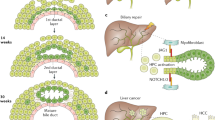Abstract
FERN-LIKE or coralline arborization patterns have been observed in human bile allowed to desiccate and examined microscopically. Blumenkrantz and Kohan1 call this phenomenon ‘rhythmic crystallization’, and suggest a relationship between paucity of arborization patterns and the presence of biliary lithiasis. Their work was carried out on bile obtained by duodenal intubation.
This is a preview of subscription content, access via your institution
Access options
Subscribe to this journal
Receive 51 print issues and online access
$199.00 per year
only $3.90 per issue
Buy this article
- Purchase on Springer Link
- Instant access to full article PDF
Prices may be subject to local taxes which are calculated during checkout
Similar content being viewed by others
References
Blumenkrantz, N., and Kohan, S., Amer. J. Dig. Diseases, 7, 484 (1962).
Blumenkrantz, N., and Moreno, A. R., Laboratorio, 32, 101 (1961).
Zondek, B., Forman, I., and Cooper, K., Fertil. Steril., 6, 523 (1955).
Blood and Other Body Fluids, 410 (Federation of American Societies for Experimental Biology, Washington, D.C., 1961).
Biochemist' Handbook, 914 (D. Van Nostrand Co., Princeton, New Jersey, 1961).
Author information
Authors and Affiliations
Rights and permissions
About this article
Cite this article
DEPALMA, R., LEVEY, S. Arborization Patterns in Human Bile. Nature 207, 637–638 (1965). https://doi.org/10.1038/207637a0
Published:
Issue Date:
DOI: https://doi.org/10.1038/207637a0
Comments
By submitting a comment you agree to abide by our Terms and Community Guidelines. If you find something abusive or that does not comply with our terms or guidelines please flag it as inappropriate.



